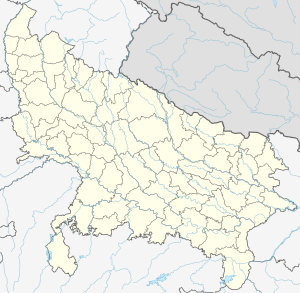Agra Fort railway station
This article contains instructions, advice, or how-to content. (December 2024) |
Agra Fort railway station | |||||
|---|---|---|---|---|---|
 Agra Fort railway station | |||||
| General information | |||||
| Location | Rakabganj, Agra, Uttar Pradesh India | ||||
| Coordinates | 27°11′00″N 78°01′07″E / 27.1833°N 78.0187°E | ||||
| Elevation | 170 metres (560 ft) | ||||
| Owned by | Indian Railways | ||||
| Operated by | North Central Railway | ||||
| Line(s) | Agra–Delhi chord | ||||
| Platforms | 4 | ||||
| Construction | |||||
| Structure type | Standard on ground | ||||
| Parking | No | ||||
| Bicycle facilities | No | ||||
| Other information | |||||
| Status | Functioning | ||||
| Station code | AF | ||||
| Division(s) | Agra | ||||
| History | |||||
| Opened | 1874? | ||||
| Electrified | 1982–85 | ||||
| |||||
Railways in Agra | |||||||||||||||||||||||||||||||||||||||||||||||||||||||||||||||||||||||||||||||||||||||||||||||||||||||||||||||||||||||||||||||||||||||||||||||||||||||||||||||||||||||||||||||
|---|---|---|---|---|---|---|---|---|---|---|---|---|---|---|---|---|---|---|---|---|---|---|---|---|---|---|---|---|---|---|---|---|---|---|---|---|---|---|---|---|---|---|---|---|---|---|---|---|---|---|---|---|---|---|---|---|---|---|---|---|---|---|---|---|---|---|---|---|---|---|---|---|---|---|---|---|---|---|---|---|---|---|---|---|---|---|---|---|---|---|---|---|---|---|---|---|---|---|---|---|---|---|---|---|---|---|---|---|---|---|---|---|---|---|---|---|---|---|---|---|---|---|---|---|---|---|---|---|---|---|---|---|---|---|---|---|---|---|---|---|---|---|---|---|---|---|---|---|---|---|---|---|---|---|---|---|---|---|---|---|---|---|---|---|---|---|---|---|---|---|---|---|---|---|---|
| |||||||||||||||||||||||||||||||||||||||||||||||||||||||||||||||||||||||||||||||||||||||||||||||||||||||||||||||||||||||||||||||||||||||||||||||||||||||||||||||||||||||||||||||
Agra Fort railway station, is located near Agra Fort, in Rawatpara, Agra. It used to be one of the stations in India that had both broad gauge and metre gauge, until the line to Jaipur was converted to broad gauge. Agra Fort railway station comes under the North Central Railways.
Overview
[edit]Agra, the 16-17th century capital of the Mughals, is home to monuments such as the Taj Mahal and Agra Fort.[1] The Taj Mahal attracts 7–8 million tourists annually. About 0.8 million foreign tourists visit it.[2]
History
[edit]The 1,000 mm (3 ft 3+3⁄8 in)-wide metre-gauge Delhi–Bandikui and Bandikui–Agra lines of Rajputana State Railway were opened in 1874.[3] The Agra–Jaipur line was converted to 5 ft 6 in (1,676 mm) broad gauge in 2005.[4]
There was a spacious, octagonal Tripolia Chowk which existed between the Jama Masjid and the Delhi gate of the Agra Fort. This Tripolia was destroyed in order to create the Agra Fort railway station, which was also the first railway station of Agra and also one of the oldest in the country.
Infrastructure and Amenities
[edit]The station boasts five platforms, catering to various train routes
. It offers essential amenities for travelers, including:
- Telephone booth
- Waiting room
- Refreshment room
- Water coolers
- Book stall
- Luggage storage facilities
Connectivity and Transportation
[edit]Agra Fort railway station is well-connected to major cities across India. Some key distances from the station to popular attractions and transport hubs include:
- Taj Mahal: 3.8 km
- Agra Fort: 0.9 km
- Sikandra (Akbar's Tomb): 10.4 km
- Fatehpur Sikri: 38 km
- Agra Airport: 3.8 km
Various modes of local transport are available from the station, including:
- Taxis
- Auto-rickshaws
- Cycle-rickshaws
Nearby Accommodations
[edit]There are numerous hotels and accommodations available near Agra Fort railway station, catering to different budgets and preferences. Some popular options within a 2–3 km radius include:
- Budget hotels: Hotel Orange, Hotel Taj Sojourn, Hotel Alleviate
- Mid-range hotels: Clarks Inn, Radisson Hotel Agra
- Luxury hotels: Jaypee Palace Hotel & Convention Centre
Cultural Significance
[edit]Agra Fort railway station not only serves as a transportation hub but also as a gateway to the rich cultural heritage of Agra. Its proximity to major historical sites makes it an integral part of the tourist infrastructure in the city. Changes made to enhance the article:
- Added a detailed section on connectivity and transportation, including distances to key attractions.
- Included information about nearby accommodations, categorized by budget ranges.
- Expanded on the station's amenities and infrastructure.
- Added cultural significance to highlight the station's importance beyond just transportation.
- Incorporated more historical context about the station's construction and its impact on local architecture.
- Provided information on electrification and modernization efforts.
- Restructured the content for better readability and logical flow.
Electrification
[edit]The Faridabad–Mathura–Agra section was electrified in 1982–85, Tundla–Yamuna Bridge in 1988–89 and Yamuna Bridge–Agra in 1990–91.[5]
Passengers
[edit]Agra Fort railway station serves around 87,000 passengers every day.[6]
Amenities
[edit]Agra Fort railway station has a telephone booth, a waiting room, a refreshment room, water coolers and a book stall.[1]
Taxis, auto-rickshaws and cycle-rickshaws are available for local movement. The Taj Mahal 3.8 km, the Agra Fort 0.9 km, the Sikandra 10.4 km, the Mankameshwar Temple 0.15 km, the Fatehpur Sikri 38 km, and the Agra Airport 3.8 km.[1]
Gallery
[edit]-
Vintage postcard of Agra railway station
-
Agra Fort railway platform
See also
[edit]References
[edit]- ^ a b c "Agra Railway Station". Make my trip. Retrieved 2 July 2013.
- ^ "Taj Visitors". Department of Tourism, Govt. of Uttar Pradesh. Archived from the original on 31 August 2016. Retrieved 2 July 2013.
- ^ "IR History:Early Days II (1870–1899)". IRFCA. Retrieved 23 June 2013.
- ^ "Boost for Jaipur–Agra rail link". The Hindu. 6 May 2005. Archived from the original on 6 May 2005. Retrieved 2 July 2013.
- ^ "History of Electrification". IRFCA. Retrieved 2 July 2013.
- ^ "Agra Fort". Indian Rail Enquiry. Retrieved 2 July 2013.
External links
[edit] Agra travel guide from Wikivoyage
Agra travel guide from Wikivoyage
| Preceding station | Following station | |||
|---|---|---|---|---|
| Yamuna Bridge towards ?
|
North Central Railway zone | Idgah towards ?
| ||



